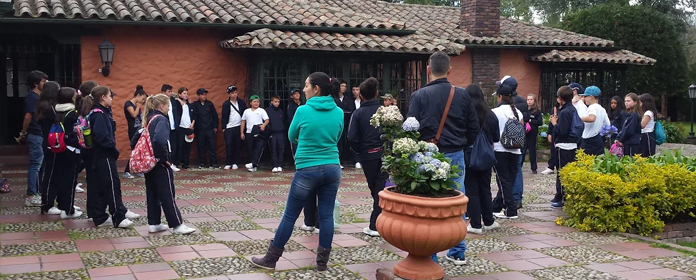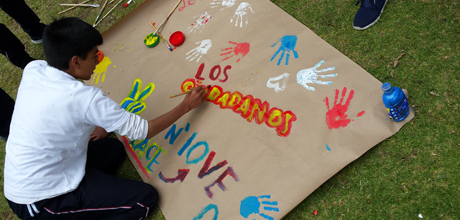Seven virtues for promote Education of character in Latin America
Experts from a project of the School of Education and Psychology and the Institute for Culture and Society (ICS) tell some experiences and human stories related to their fieldwork in Argentina, Mexico and Colombia.

PHOTO: Courtesy
The Education of character is necessary for all young people, regardless of their status and socioeconomic stratum. This is indicated by the experts of project of research 'Investigar y promote la Education del carácter en escuelas de secundaria en Latinoamérica', developed between 2016 and 2018 by the School of Education and Psychology and the Institute for Culture and Society (ICS) of the University of Navarra with funding from Templeton World Charity Foundation.
During the research field work was carried out in schools in Argentina, Mexico and Colombia, focusing on 12-13 year old students. The chosen schools had very different characteristics: students with different socioeconomic situations subject, mixed and differentiated classrooms, public and private ownership... In them, the difficulties that children and adolescents experience in the out-of-school context have been confirmed , making teaching in values even more important.

The researchers propose that the following seven virtues should be reinforced in schools Education . The international research community considers them to be universal in nature and fundamental to the development of individuals and societies.
Fortitude/bravery/courage. It is the ability to overcome difficulties that may arise when pursuing a goal goal.
During the fieldwork in Latin America, the researchers came across numerous cases of people who had overcome difficulties with great courage. They especially remember the case of an adolescent from Colombia, who came from a very dysfunctional family with very few resources. His father had abandoned him, his mother had been in prison and he knew he was an unwanted child. He had been abused by several people around him, he had been on the verge of death several times due to various accidents.... In spite of his hard history, he had a very good academic transcript , he had obtained a scholarship and wrote poetry. He confessed that high school was for him "a break" and that he had found in it the support to overcome all those problems. His dream was to go to university.
Compassion. It is being aware of the needs of others and acting to help them.
The researchers highlight an initiative of a high socioeconomic high school in Argentina. The center seeks to make student body, coming from affluent families, aware of the needs of their environment and encourages them to alleviate them. Thus, it has a program that promotes various visits: to schools with scarce resources to promote values such as civic commitment or respect for diversity; to elderly people in a nursing home to promote the spirit of service and social solidarity; and to underprivileged schools to reflect on the status underprivileged people. They also report that another Argentinean high school launched an initiative to value one's own life and that of others. In each subject they develop a project related to 'Educating for life'; in 'training ethics and citizenship' they work specifically on issues such as privacy in social networks, cyberbullying, sexting....
Justice. It means giving everyone their due.
Spanish specialists give the example of an inclusive school in Colombia that takes in children and young people rejected by other schools for misbehavior, poor academic performance, cognitive disorders.... The students suffer from a variety of problems subject -some go hungry at home, others are involved in drugs, others have disabilities...- and the center breaks the paradigms of the traditional school to give each one what he or she needs. It proposes three models: an acceleration model for those who have interrupted their programs of study and are catching up to resume them; a literacy model for children who can barely read or write; and a model for youth and adults. The school has managed to improve the lives of many children: it covers their basic educational needs and fosters interpersonal relationships to help them integrate into society. An example of social justice that serves as model for student body and its environment.
Honesty. It consists of acting righteously, from agreement with what one thinks is right.
The researchers mention a high school in Mexico where there were problems of theft, from money to cell phones, as well as simpler objects. Through a values program, they worked on various virtues with the entire school community. Each month they dealt with one. Since they addressed honesty, the teachers observed an improvement in behavior: there were more returns of lost items and fewer complaints about theft.
Self-discipline. It involves focusing the will and sacrifice to achieve a goal, immediate or long term deadline.
In most of the schools they have analyzed, researchers have detected problems of self-control, especially in the use of new technologies and social networks, and also in the abuse of tobacco and alcohol -drugs are present to a lesser extent-. As an example of good practices, they speak of a high school in Argentina that has worked on self-discipline to promote a culture of impulse control in favor of coexistence within classroom. The psychologist and the psychopedagogist talk to the students, talk to the parents.... They look for types of personalities, establish diagnoses of problems and influence the process of reflection that financial aid to grow in this virtue. Sanction mechanisms and coexistence regulations have also been introduced, both for students and teachers. The center has put in place measures to avoid misconduct by discipline teachers (tardiness, selling objects on class) in order to make them an example for students.
Gratitude. It is about valuing goods, benefits, gifts and favors received from others.
The team from the University of Navarra points out that the students from Mexico, Colombia and Argentina they have interviewed have a very material sense of gratitude, related to goods and objects. They perceive the need to train them to be grateful for benefits and favors received. With the goal that teaching them to value the intangible more, they propose encouraging service-learning experiences (for example, encouraging students with higher academic performance to help those with lower performance one day a week). They believe that these practices can help to improve gratitude towards things that are not material and to recognize that what others do for you is not necessarily an obligation.
Humility/modesty. It is knowing and accepting the truth about oneself.
The researchers consider that encouraging spaces for self-reflection and analysis of the problems of minors, accepting the shortcomings experienced in each context, is very fruitful for growing in humility. One of the schools they have visited in Argentina promotes coexistence for students to think about their daily behavior, how they can improve their relationship with people close to them, their weaknesses and their ability to overcome the difficulties they encounter.
